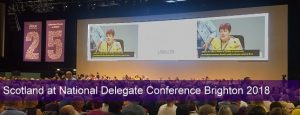 The branch has had a great conference, with two of our key motions debated and supported overwhelmingly by Conference delegates.
The branch has had a great conference, with two of our key motions debated and supported overwhelmingly by Conference delegates.
Your branch delegates were Inez Kirk, Ann Gray, Morag Lawrence and Kathleen Kennedy . Inez, Ann and Kathleen all spoke in debates and Kate Ramsden was at the podium twice in her role as NEC member, the union’s lay leadership body.
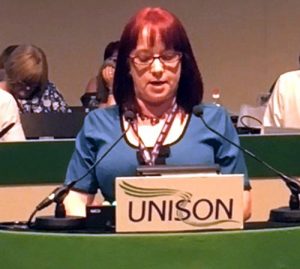
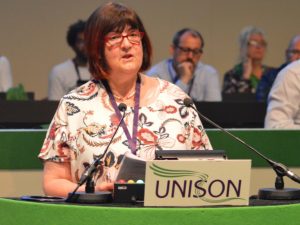
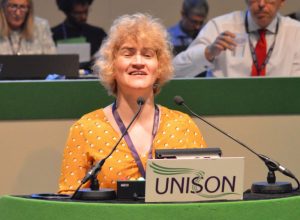
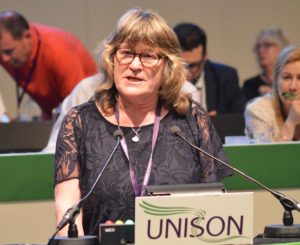
Links to the UNISON Scotland website with all the input from all the branch members are below.
We must all act to end the detention of Palestinian children
UNISON will organise for the participation of low paid women

It was an upbeat conference, which recognised that the UK Tory government’s days could be numbered and that a Corbyn led Labour government was waiting in the wings. Unfortunately the man himself could not be with us but we heard a great presentation from Angela Rayner, Shadow Minister for Education and herself a UNISON member.
It was also an emotional conference as delegates heard of the serious impact of government policies on our members and on our poorest and most vulnerable citizens.
In a moving debate on Grenfell we heard of the real impact of that terrible and most avoidable tragedy on the survivors and the families of the victims. But also on our members working in the council. Dealing day by day with traumatised, grieving people, who they often cannot give answers to. Despite promises it is clear that neither the council nor the Government have made good on pledges to rehouse survivors and many still live in temporary accommodation. Their anger is justified and it is our members in housing, in social work and other services to whom it is expressed.
Our union has been at the forefront of supporting members but also supporting the families and the survivors. This is especially needed as the Inquiry moves forward, and the hope is that this will find answers to how this happened and how to make sure it will never happen again; that this inquiry will place the blame where it needs to go – on austerity cuts by this government; on a council that cared little for the safety of the Grenfell tenants and despite warnings failed to act; on racist policies at every level of government. Conference pledged to continue this support.
There was also an emotional debate on Windrush as delegates condemned May’s “hostile environment” policy – another feature of a racist government, which has failed to bring any humanity to the plight of EU migrants, immigrants, asylum seekers and refugees.
But the Windrush generation have rights to live and work in this country. Many have contributed to this country for more than 50 years. Yet the government has sought to deport them; to deny them their livelihoods, their homes, and medical treatment. It’s shameful and delegates made that very clear.
Again UNISON has been in the vanguard of the fight for our Windrush members’ rights but has also spoken out strongly against the government’s hostile environment policy which is both racist and lacks any compassion.
And even as conference was roundly condemning Israel’s treatment of Palestinian children, Trump was separating children from their parents at the Mexican Border in an act which drew outrage from all over the world.
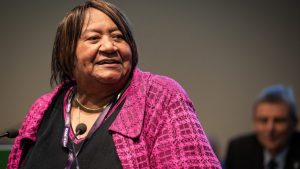
In an inspiring presentation to Conference, Lorretta Johnson, from the American Federation of Teachers, which also organises in health and social care, slammed Trump’s behaviour, saying to delegates that once again it is ordinary people, union members, leading the fight against such inhumane policies.
She said, “Our fightback and our fight forward will not be easy but if we stand together we will win. Unity and solidarity across nations,” she said, adding that it is time for women to come forward in the union.
To laughter, applause and a standing ovation, Lorretta ended, “If you see me in a fight with a bear, help the bear!”
In a strange turn of events, Conference voted against a wide-ranging composite which would have provided a comprehensive framework for a strategic review of our union in its 25th year. The composite incorporated motions from the National Executive Council, the National Young Members Forum, the National Disabled Members’ Organisation, seven different Regions and five different branches.
Scotland’s amendment called for devolution to be central to the review.
However because if it were passed, it would have meant that a motion on branch funding would fall, delegates threw it out. Ironically that motion was never reached.
Perhaps the handling of the vote by the platform was an element in the decision of branches. Whatever the reason, it means that there is now no mandate for the review and what would have been a very inclusive, democratic process will now need to wait.
